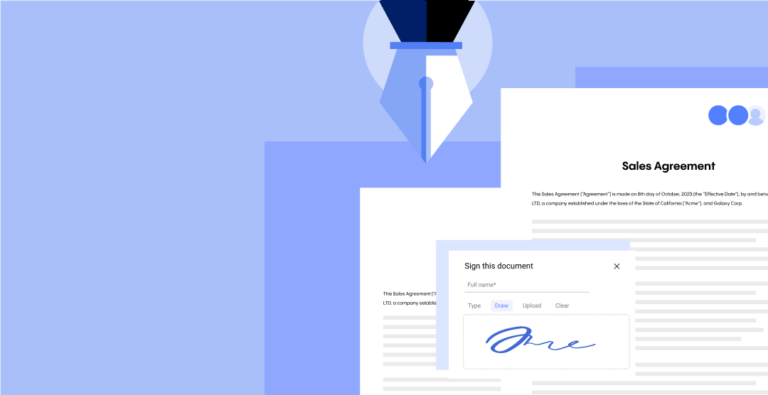What’s the best contract lifecycle management software in 2025?
The best contract lifecycle management software in 2025 includes Concord, ContractSafe, ContractWorks, and Ironclad. Concord leads with 22.29% market share, offering AI-powered Agreement Intelligence, built-in e-signature, and implementation in less than 1 day starting at $399/month. Other top platforms range from $375-$2,000/month with varying implementation times (days to months) and feature sets. Key evaluation criteria include AI capabilities, integration ecosystems, user experience, and ROI potential of 91-183x per dollar invested.
| Platform | Starting Price | Implementation Time | E-Signature | AI Capabilities | User Pricing Model | Integration Strength |
|---|---|---|---|---|---|---|
| Concord | $399/month | Days | Built-in | Agreement Intelligence | Per month | ⭐⭐⭐⭐⭐ |
| ContractSafe | $375/month | Days to weeks | Through integrations | Basic extraction | Contract volume (unlimited users) | ⭐⭐⭐⭐ |
| ContractWorks | $700-$2,000/month | Weeks | Limited licenses | Basic AI | Unlimited users | ⭐⭐ |
| Ironclad | ~$25,300/year | 3-6 months | Requires integration | Advanced playbooks | Enterprise model | ⭐⭐⭐ |
| Agiloft | Custom quote | Months | Available | Customizable AI | Custom | ⭐⭐⭐ |
| DocuSign CLM | ~$39/month per feature | Weeks to months | Native | Basic extraction | Per user | ⭐⭐⭐⭐ |
| CobbleStone | Custom quote | Weeks to months | Enterprise tier only | VISDOM AI | Custom | ⭐⭐ |
| LinkSquares | ~$10,000/year | Weeks | Separate module | 7-10 day processing | Custom | ⭐⭐ |
| Contractbook | Custom quote | Days to weeks | Unlimited included | Limited | Custom | ⭐⭐ |
| ContractZen | $9.50/month per user | Days | Integration (buggy) | Limited | Per user | ⭐ |
| SpotDraft | Custom quote | 1-6 weeks | Available | NLP-focused | Custom | ⭐⭐⭐⭐ |
| Evisort | Custom quote | 30+ days | Available | Advanced analysis | Custom | ⭐⭐⭐ |
| Outlaw | Custom quote | Weeks | Available | Limited | Custom | ⭐⭐⭐ |
| Gatekeeper | $995/month | Weeks | Available | Limited | Flat rate (unlimited users) | ⭐⭐⭐⭐⭐ |
Agiloft
Agiloft delivers a highly customizable contract management platform that appeals to organizations needing extensive configuration options. However, this flexibility comes with significant trade-offs in implementation time, user experience, and total cost.
While Agiloft’s deep customization capabilities make it powerful for complex enterprise deployments, most organizations find that Concord provides the comprehensive features they need with dramatically faster implementation and a more intuitive user experience.
Implementation timeline
- Concord deploys in less than 1 day with streamlined onboarding
- Agiloft typically requires 2-3 months for basic implementation
- Concord’s rapid deployment means immediate productivity gains
User experience & adoption
- Concord’s Gmail-like interface promotes quick user adoption
- Agiloft’s complex interface requires substantial training investment
- Higher adoption rates with Concord translate to better contract management
Pricing & value
- Concord starts at $399/month with transparent, all-inclusive pricing
- Agiloft pricing begins around $6,000/year, often reaching $60,000+ for enterprises
- Concord includes unlimited e-signatures; Agiloft requires third-party integration
AI & analytics
- Both platforms offer AI capabilities for contract analysis
- Concord’s Agreement Intelligence works out-of-the-box
- Agiloft’s AI features require extensive configuration
Conga Contracts
Conga Contracts extends the broader Conga product suite with contract lifecycle management capabilities, particularly for organizations already invested in the Conga ecosystem. The platform emphasizes enterprise features and Salesforce integration but struggles with user adoption due to interface complexity.
Organizations comparing these solutions often find that Concord delivers more comprehensive contract management functionality with significantly better ease of use and faster time to value.
Market position & customer base
- Concord holds a large market share with 1,500+ customers
- Conga CLM has 1.95% market share with 266 customers
- Concord’s broader adoption reflects its accessibility and value
Feature completeness
- Both offer full contract lifecycle management
- Concord includes native e-signature at no extra cost
- Conga Sign requires additional fees for e-signature functionality
- Concord supports more file formats (.docx, .pdf, .html vs. just .docx)
Implementation & usability
- Concord implementation takes less than 1 day
- Conga typically requires weeks to months for deployment
- Users consistently rate Concord’s interface as more intuitive
Integration ecosystem
- Concord connects with 5,000+ business applications
- Strong native integrations with major platforms
- Conga offers more limited integration options
ContractBook
ContractBook positions itself as a modern contract management solution with a focus on document creation and e-signatures. Originally from Denmark, the platform serves primarily small to mid-market organizations looking for basic contract functionality.
However, organizations evaluating both platforms typically discover that Concord offers substantially more comprehensive contract lifecycle management capabilities at a better price point, making it the more strategic long-term choice.
Functional scope
- Concord provides complete lifecycle management from creation through renewal
- ContractBook focuses primarily on document creation and e-signing
- Concord includes advanced analytics, deadline tracking, and reporting
- ContractBook lacks comprehensive contract intelligence features
Pricing structure
- Concord starts at $399/month with all features included
- ContractBook’s Foundation plan starts at $999/month
- ContractBook charges $395/month extra for department-specific add-ons
- Concord’s pricing model scales more efficiently for growing organizations
Integration capabilities
- Concord offers 5,000+ native integrations
- ContractBook relies on Zapier for most connections (3,000+ apps)
- Concord provides direct API access for custom integrations
- Native connections deliver better performance and reliability
ContractSafe
ContractSafe has built a reputation as a simple, affordable contract repository solution that excels at basic contract storage and deadline tracking. This focused approach appeals to organizations with straightforward contract management needs.
However, companies requiring more than just storage and alerts typically find that Concord’s complete lifecycle management capabilities, while starting at a similar price point, deliver significantly more value through comprehensive functionality.
Functional differences
- Concord offers full contract creation, negotiation, and execution
- ContractSafe focuses on post-signature storage and tracking
- Concord includes built-in e-signature; ContractSafe requires DocuSign
- Both provide strong search and alert capabilities
AI & intelligence
- Concord’s Agreement Intelligence extracts data and identifies risks
- ContractSafe offers basic AI for document categorization
- Concord provides compliance monitoring and obligation tracking
- Advanced analytics available in Concord but not ContractSafe
Pricing models
- ContractSafe uses contract-volume pricing ($375/month for 500 contracts)
- Concord starts at $399/month with more flexible scaling
- ContractSafe includes unlimited users; Concord varies by plan
- Total cost often favors Concord for organizations with high contract volumes
ContractWorks
ContractWorks provides a straightforward contract management platform focused on secure storage, deadline tracking, and built-in e-signatures. The solution appeals to organizations seeking simplicity over comprehensive features.
While ContractWorks delivers on its promise of easy contract organization, companies comparing these platforms generally find that Concord offers significantly more functionality at a lower starting price, making it the better value for most organizations.
Core capabilities
- Both platforms offer secure contract storage and e-signatures
- Concord adds contract creation, negotiation, and editing capabilities
- ContractWorks focuses solely on post-signature management
- Concord provides comprehensive workflow automation
Technology & integrations
- Concord offers extensive integrations with 5,000+ applications
- ContractWorks has limited integration options (primarily Salesforce)
- Concord provides a robust API; ContractWorks offers no API access
- Modern architecture gives Concord more flexibility
Pricing comparison
- Concord starts at $399/month with comprehensive features
- ContractWorks starts at $700/month for basic functionality
- Both include unlimited users at their respective price points
- Concord delivers more features per dollar invested
ContractZen
ContractZen markets itself as an all-in-one governance suite that includes contract management alongside board portals, virtual data rooms, and entity management. This multi-purpose approach can appeal to small organizations wanting a single platform for various governance needs.
However, organizations focused specifically on contract management often find that Concord’s dedicated approach delivers superior contract functionality without the distraction and complexity of unrelated governance features.
Platform focus
- Concord specializes exclusively in contract lifecycle management
- ContractZen divides attention across multiple governance areas
- Dedicated focus allows Concord to deliver deeper contract functionality
- ContractZen users report confusion navigating multiple modules
User experience
- Concord’s interface is optimized for contract workflows
- ContractZen’s interface accommodates multiple use cases
- Reviews indicate ContractZen’s UI feels “crowded” and complex
- Concord consistently receives praise for intuitive design
True cost analysis
- ContractZen’s $9.50/user/month seems affordable but adds up quickly
- Virtual Data Room features cost extra after 30 days
- Concord’s $399/month includes all features with no hidden costs
- For teams over 15 people, Concord typically offers better value
CobbleStone
CobbleStone Contract Insight brings three decades of experience to the contract management space, offering a feature-rich platform with extensive customization options. The platform particularly appeals to government agencies and large enterprises with complex requirements.
However, this depth of functionality comes with a steeper learning curve and longer implementation times, leading many organizations to prefer Concord’s more modern, accessible approach to contract management.
Implementation & time to value
- Concord deploys in less than 1 day with immediate usability
- CobbleStone typically requires 2-4 weeks for basic setup
- Faster implementation with Concord means quicker ROI
- Less disruption to daily operations with Concord’s approach
User adoption
- Concord’s Gmail-like interface promotes rapid adoption
- CobbleStone requires extensive training for effective use
- Reviews note contract entry in CobbleStone can take 10 minutes
- Higher user satisfaction scores for Concord’s design
AI capabilities
- Both platforms leverage AI for contract intelligence
- CobbleStone’s VISDOM AI requires significant configuration
- Concord’s Agreement Intelligence works effectively out-of-the-box
- Similar accuracy but different implementation complexity
DocuSign CLM
DocuSign CLM extends the company’s dominant e-signature platform into full contract lifecycle management, targeting large enterprises with complex requirements. The platform leverages DocuSign’s brand recognition and existing customer relationships.
However, organizations evaluating both solutions often discover that DocuSign CLM’s enterprise focus results in extended implementation timelines, steep learning curves, and substantial costs that make Concord a more practical choice for most businesses.
Implementation reality
- Concord implements in 1-2 days with minimal resources
- DocuSign CLM typically requires 2-6 months and consultants
- Significant difference in time-to-value between platforms
- Lower total implementation costs with Concord
User experience
- Concord maintains an intuitive, Gmail-like interface
- DocuSign CLM presents a complex, enterprise-focused design
- Training requirements differ dramatically between platforms
- User adoption rates favor Concord’s approach
Pricing for value
- DocuSign CLM requires enterprise sales engagement for pricing
- Hidden costs common with DocuSign CLM implementation
- Concord’s transparent pricing starts at $399/month
Dropbox Sign
Dropbox Sign (formerly HelloSign) excels as a streamlined e-signature solution, consistently ranking high for ease of use and implementation speed. The platform serves organizations needing reliable document signing capabilities without complexity.
However, companies requiring functionality beyond just signatures quickly discover Dropbox Sign’s limitations, making Concord’s comprehensive contract lifecycle management platform a more complete solution for most business needs.
Scope of Functionality
- Dropbox Sign handles only the signature phase of contracts
- Concord manages the entire contract lifecycle end-to-end
- No contract creation, negotiation, or analytics in Dropbox Sign
- Concord includes deadline tracking and renewal management
Pricing Models
- Dropbox Sign charges $15-25/month per user
- Costs escalate quickly for larger teams
- Concord starts at $399/month with unlimited users
- Better value proposition for multi-user organizations
Intelligence & Analytics
- Dropbox Sign offers basic signature workflow automation
- Concord provides AI-powered contract intelligence
- Risk identification and compliance monitoring in Concord
- Strategic insights unavailable in Dropbox Sign
Evisort
Evisort has positioned itself as an AI-first contract intelligence platform, emphasizing advanced machine learning capabilities for contract analysis. The platform attracts organizations with dedicated technical resources seeking cutting-edge AI functionality.
However, this technical focus often results in extended implementation times and complexity that many organizations find unnecessary, especially when Concord delivers sophisticated AI capabilities in a more accessible package.
Market presence
- Concord holds a large market share with 1,500+ customers
- Market adoption reflects ease of use and practical value
- Broader industry acceptance of Concord’s approach
Implementation & complexity
- Concord deploys in 1-2 days with minimal configuration
- Evisort typically requires 30+ days for implementation
- Technical expertise required for Evisort deployment
- Concord’s pre-trained AI models work immediately
AI accessibility
- Both platforms offer advanced AI capabilities
- Evisort requires technical specialists to leverage AI
- Concord makes AI accessible to all users
- Similar outcomes with different complexity levels
Gatekeeper
Gatekeeper provides a vendor and contract lifecycle management platform popular in the UK and European markets. The solution emphasizes supplier management alongside contract functionality, appealing to procurement-focused organizations.
However, companies evaluating both platforms often find that Gatekeeper’s older architecture and extended implementation timelines make it less attractive than Concord’s modern, rapidly deployable solution.
Implementation timeline
- Concord deploys in less than 1 day
- Gatekeeper typically requires 8-12 weeks
- Significant difference in resource requirements
- Faster time-to-value with Concord
Modern architecture
- Concord built with contemporary technology stack
- Mobile-first design with native applications
- Gatekeeper shows its age in user interface
- API and integration capabilities favor Concord
Contract focus
- Concord specializes in contract lifecycle management
- Gatekeeper splits focus between vendor and contract management
- Deeper contract-specific features in Concord
- More comprehensive analytics and reporting
Ironclad
Ironclad has emerged as a well-funded contract lifecycle management platform targeting technology companies and modern legal teams. The platform emphasizes workflow automation and developer-friendly features.
While Ironclad has gained traction in Silicon Valley, organizations comparing these solutions often find that Concord delivers similar capabilities with significantly faster implementation and a more accessible user experience.
Deployment differences
- Concord implements in 1-2 days
- Ironclad typically requires 3-6 months
- Technical resources needed for Ironclad setup
- Business users can configure Concord independently
User accessibility
- Concord maintains an intuitive interface for all users
- Ironclad’s interface favors technical users
- Training requirements differ significantly
- Adoption rates typically higher with Concord
Pricing transparency
- Concord publishes clear pricing starting at $399/month
- Ironclad requires enterprise sales engagement
- Implementation costs often hidden with Ironclad
- More predictable total cost with Concord
Juro
Juro represents a newer generation of contract management platforms, focusing on browser-based collaboration and modern user experience. The platform has gained traction in European markets, particularly with small legal teams.
Organizations comparing these solutions should consider that while Juro offers innovative features, Concord’s established market presence, broader feature set, and extensive integration ecosystem typically provide more comprehensive value.
Market Maturity
- Concord serves 1,500+ companies globally
- More established platform with proven scalability
- Broader industry coverage and use cases
- Extensive customer success resources
Feature Depth
- Both platforms offer modern, collaborative interfaces
- Concord provides more advanced AI capabilities
- Broader workflow automation options in Concord
- More comprehensive analytics and reporting
Integration Ecosystem
- Concord connects with 5,000+ applications
- More native integrations available
- Robust API for custom development
- Better support for complex tech stacks
LinkSquares
LinkSquares focuses primarily on AI-powered contract analytics and post-signature management, making it popular with legal teams seeking to extract insights from existing contracts. The platform excels at contract repository management and analysis.
However, organizations needing full lifecycle capabilities often find that Concord’s comprehensive platform, which includes pre-signature functionality, provides better end-to-end value.
Lifecycle coverage
- Concord manages contracts from creation through renewal
- LinkSquares focuses mainly on post-signature management
- Contract creation and negotiation native in Concord
- LinkSquares requires separate tools for pre-signature work
E-signature capabilities
- Concord includes unlimited native e-signatures
- LinkSquares requires third-party e-signature integration
- Cost savings with Concord’s inclusive model
- Simpler workflow with integrated signing
Implementation speed
- Concord deploys in 1-2 days
- LinkSquares typically takes several weeks
- Faster ROI achievement with Concord
- Less disruption to existing processes
Outlaw
Outlaw positions itself as a modern contract management platform with strong document automation capabilities and a focus on user experience. The platform appeals to organizations seeking an alternative to traditional CLM solutions.
While Outlaw offers solid functionality, companies comparing these platforms should consider Concord’s larger market presence, more extensive feature set, and proven scalability when making their decision.
Platform maturity
- Concord has broader market adoption and customer base
- More extensive track record across industries
- Larger support and success team infrastructure
- Proven ability to scale with growing organizations
Feature completeness
- Both offer modern contract lifecycle management
- Concord provides more advanced AI analytics
- Broader integration options with Concord
- More comprehensive compliance features
Support & resources
- Concord offers dedicated success managers
- More extensive knowledge base and training resources
- Faster implementation with experienced team
- Higher customer satisfaction ratings
PandaDoc
PandaDoc has built a strong reputation in document automation and e-signatures, particularly for sales teams creating proposals and quotes. The platform includes some contract management features but maintains its focus on document generation.
Organizations requiring true contract lifecycle management capabilities typically find that Concord’s purpose-built platform delivers more comprehensive functionality for managing complex contract portfolios.
Core focus areas
- PandaDoc specializes in sales document automation
- Concord built specifically for contract lifecycle management
- Different approaches to workflow and approval processes
- Contract-specific features more robust in Concord
Analytics & intelligence
- Concord offers AI-powered contract analytics
- Advanced risk identification and compliance monitoring
- PandaDoc provides basic document analytics
- Strategic contract insights exclusive to Concord
Enterprise readiness
- Concord designed for complex contract management needs
- Advanced permission systems and audit trails
- PandaDoc better suited for simpler document workflows
- Scalability differences for growing organizations
SpotDraft
SpotDraft represents one of the newer entrants in the contract lifecycle management space, targeting fast-growing technology companies with a modern, API-first approach. The platform emphasizes speed and simplicity.
While SpotDraft shows promise, organizations comparing these solutions should weigh Concord’s established market presence, proven scalability, and more comprehensive feature set when evaluating long-term contract management needs.
Market position
- Concord has established leadership in contract management
- Broader customer base across multiple industries
- More extensive partner ecosystem
- Proven platform stability and reliability
Feature maturity
- Concord offers more sophisticated AI capabilities
- Broader workflow automation options
- More comprehensive analytics and reporting
- Extensive integration library
Implementation & support
- Both platforms emphasize quick deployment
- Concord’s larger team provides more support resources
- More extensive documentation and training materials
- Higher customer success ratings
Real-world impact: Case studies in the best contract lifecycle management software
Case Study: Standardized Workflows Save Time and Money at Yates Construction

Key Benefits:
- • Centralized repository
- • Automated workflows
- • Version control
With 5,000 employees across 15 divisions, Yates Construction struggled with decentralized contract processes that created delays and compliance risks.
How Concord helped:
- • Concord unified all 15 divisions on one platform
- • Automated sending replaced manual email chains
- • Clear audit trails prevent unauthorized edits
“A lot of subcontractors refuse to go to work until they have a signed contract, so Concord gets our projects moving much faster. It provides tools that enable you to use it the way you need to.” — Jenny McMullen, Corporate Contract Administrator
Case Study: Optimized Workflows Boost Grant Funding at Pima Community College

Key Benefits:
- • Centralized discussions
- • Real-time visibility
- • Flexible access controls
Pima Community College relies on grants for 20% of its budget but faced inefficient processes that jeopardized funding. Email-based workflows caused delays and missed deadlines.
How Concord helped:
- • Concord’s discussion tab centralizes all stakeholder communication
- • Automated email notifications keep everyone informed
- • Department-specific access maintains security
“Concord gives us the ability to have discussions right in the platform. And it sends out emails so everybody stays in the loop. You can give somebody full view who needs access to all contracts, and then narrow it down to a department.” — Julie Delayo, Executive Director for Sponsored Programs
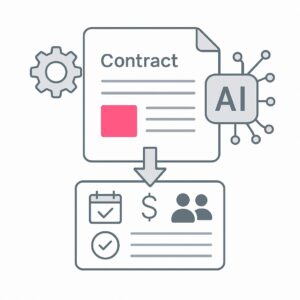
Spotlight on Concord: Leading the Agreement Intelligence revolution
Among the top contract management platforms of 2025, Concord stands out as a pioneer in Agreement Intelligence, offering a comprehensive solution designed for businesses of all sizes.
Key strengths and differentiators
Concord has positioned itself as a leader in the Agreement Intelligence space through several key capabilities:
1. AI-powered data extraction
Concord’s AI technology automatically extracts key terms from agreements, including:
- Deadlines and renewal dates
- Contract values and payment terms
- Party information and obligations
- Key clauses and compliance requirements
As Matt Lhoumeau, CEO of Concord, explains: “By automating the extraction and entry of key terms, our users can focus on strategic tasks rather than tedious administrative work” (AccessWire, 2024).
2. Intuitive collaboration features
Concord enables seamless collaboration with:
- Real-time editing and commenting
- Microsoft Word and Google Docs integration
- Intuitive redlining capabilities
- Structured approval workflows
- Internal and external collaboration controls
3. Comprehensive lifecycle management
The platform manages the entire contract lifecycle:
- Template-based contract creation
- Collaborative negotiation and approval
- Integrated e-signature capabilities
- Obligation tracking and management
- Renewal and amendment workflows
4. Robust integration ecosystem
Concord works seamlessly with over 5,000 applications, simplifying contract-related collaboration across different teams. This extensive connectivity ensures contract data flows smoothly across the organization.
5. Scalable pricing model
Concord offers transparent pricing with plans to accommodate businesses of all sizes. All plans include unlimited e-signatures and documents, with additional features available at higher tiers.
Real Customer ROI: Detailed Case Studies
Denison University: 30% Reduction in Contract Administration Time
Denison University implemented Concord to centralize contract management across their departments. Their legacy signing process was inefficient – contracts had to be emailed, printed, signed by hand, then scanned and returned. For an institution with 2,300 students and 850 staff generating over 4,000 agreements annually, this process was extremely time-consuming.
“Concord has all the functionality we need, and we’re still finding even more ways in which it’s useful. We’re saving a whole lot of time.”
Measurable Results:
- 30% reduction in time spent correcting and organizing contracts
- Eliminated manual data entry with AI-powered extraction
- Improved negotiation capabilities leading to thousands in additional value
- Simplified contract creation with templating system
Sevita: Eliminated Revenue Loss from Missed Contract Deadlines
Sevita, a healthcare provider with 40,000+ employees, was losing significant revenue due to missed contract termination deadlines and renewal opportunities. With contracts scattered across the organization, they lacked visibility into vendor agreements, often missing chances to renegotiate for better terms.
“Many hours saved, many dollars saved in contracts that we meant to terminate and forgot.”
Measurable Results:
- Eliminated missed termination notices through automated tracking
- Prevented unwanted auto-renewals with deadline alerts
- Improved visibility into renewal opportunities
- Consolidated contract management across the enterprise
Yates Construction: $15,000 Monthly Savings in Administrative Costs
Yates Construction implemented Concord to centralize contract management across 15 regional divisions. Prior to Concord, their decentralized approach created significant challenges with inconsistent subcontractor qualification processes.
“Concord gets our projects moving much faster. A lot of subcontractors refuse to go to work until they have a signed contract.”
Measurable Results:
- $15,000 monthly savings in reduced administrative overhead
- 25% reduction in contract administration costs
- Accelerated project timelines with faster contract execution
- Eliminated manual tasks like emailing contracts and tracking versions
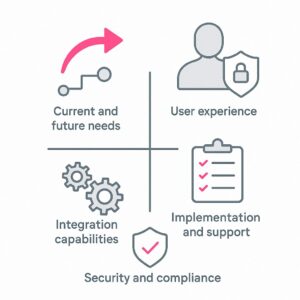
Selecting the best contract lifecycle management solution in 2025
When evaluating contract management platforms, organizations should consider:
1. Current and future needs
Look beyond immediate requirements to consider how the platform will support your organization’s growth and evolution.
2. User experience
The best technology is worthless if people won’t use it. Evaluate platforms for intuitiveness and ease of adoption.
3. Integration capabilities
Ensure the platform can connect seamlessly with your existing technology ecosystem.
4. Implementation and support
Consider the vendor‘s implementation approach, training programs, and ongoing support offerings.
5. Security and compliance
Verify that the platform meets your organization’s security requirements and regulatory obligations.
Frequently Asked Questions About Contract Lifecycle Management Software
What is contract lifecycle management software?
Contract management software is a specialized solution that helps organizations create, execute, manage, analyze, and optimize their contracts throughout the entire lifecycle. Modern solutions leverage AI to extract key data, automate workflows, provide analytics, and integrate with other business systems to transform contracts from static documents into strategic assets.
How does AI improve contract lifecycle management?
AI enhances contract management by automatically extracting key terms from contracts, identifying patterns across agreements, flagging potential risks, suggesting optimized language, monitoring compliance, anticipating renewal opportunities, and providing predictive analytics for better decision-making. This significantly reduces manual effort while improving accuracy and strategic insights.
What is the typical ROI for contract lifecycle management software?
According to industry studies, organizations implementing modern contract management solutions can expect ROI ranging from 300% to 450%. This includes direct cost savings from reduced administrative burden, prevention of contract value leakage, and strategic benefits from better supplier relationships and risk management. PwC research indicates enterprises could save 2% of their total annual costs through automated contract management systems.
How long does implementation typically take?
Implementation timelines vary based on organizational complexity, contract volume, and integration requirements. Typical timeframes range from 1-3 months for standalone solutions to 6-12 months for fully integrated source-to-pay platforms. Phased approaches often yield faster time-to-value and higher adoption rates.
What’s the difference between CLM and Agreement Intelligence?
While Contract Lifecycle Management (CLM) focuses on managing the contract process from creation to renewal, Agreement Intelligence represents the next evolution—using AI to extract meaningful insights from contract data, identify patterns across agreements, predict outcomes, and drive strategic decision-making.
How does contract lifecycle management software integrate with other systems?
Modern solutions offer API-based integration with ERP systems (for financial data), CRM platforms (for customer contracts), procurement systems (for sourcing alignment), e-signature tools (for execution), and business intelligence platforms (for deeper analysis), creating a seamless flow of data across the organization. Concord, for example, integrates with over 5,000 applications to ensure contract data is accessible where needed.
How secure is cloud-based contract management software?
Leading contract management platforms employ bank-level encryption, role-based access controls, detailed audit trails, and regular security audits to protect sensitive contract data. Many platforms also offer compliance with international regulations like GDPR, HIPAA, and SOC 2 to ensure data protection and privacy.
Can contract management software handle different contract types?
Yes, advanced contract management solutions can handle virtually any contract type, including vendor agreements, sales contracts, employment agreements, NDAs, real estate leases, licensing agreements, and more. The best platforms offer customizable templates and workflows to accommodate different contract requirements across departments and use cases.
Does the platform integrate with DocuSign?
Concord’s DocuSign integration allows you to export your Concord documents to DocuSign and sign them from there.
Is the reporting feature customizable? Can we design our own dashboards?
Yes, you can create reports such as # of docs by status per month, document status by month of creation, docs e-signed by Concord by month, etc.
What plans include SSO?
Concord’s Enterprise plan includes the SSO feature.
Can I set up my own integrations with systems that Concord does not support?
Yes, you can set up other tool integrations with Concord using Zapier, webhooks, or API. Zapier alone allows integrating Concord with over 5000 applications.
Is there a trial or demo version available for testing?
No, but a free demo is available.
Is our contract data used to train LLMs for the AI extract feature?
We have a Zero Data Retention (ZDR) policy meaning contract and/or customer data is not used to train AI models.
What are the key features to look for in contract management software?
Essential features include centralized contract repository, automated alerts and reminders, customizable templates, e-signature integration, role-based access controls, AI-powered data extraction, compliance tracking, reporting and analytics dashboards, and seamless integration capabilities with existing business systems.
How does contract management software reduce risk?
Contract management software reduces risk by ensuring compliance with regulatory requirements, tracking contract obligations and milestones, identifying non-standard terms, monitoring vendor performance, preventing auto-renewals of unfavorable contracts, and maintaining complete audit trails for all contract-related activities.
What is the difference between on-premise and cloud-based contract management?
On-premise solutions require local server installation and IT maintenance but offer complete data control. Cloud-based solutions provide lower upfront costs, automatic updates, remote accessibility, better scalability, and reduced IT burden while maintaining enterprise-grade security through trusted cloud providers.
Can contract management software help with contract negotiations?
Yes, modern contract management platforms support negotiations through redlining capabilities, version control, collaboration tools, clause libraries with pre-approved language, AI-powered suggestions for optimal terms, and analytics showing historical negotiation patterns to strengthen your position.
How much does contract management software typically cost?
Pricing varies widely based on features, user count, and contract volume. Basic solutions start around $20-50 per user per month, while enterprise platforms with AI capabilities and extensive integrations can range from $100-500+ per user monthly. Most vendors offer tiered pricing with volume discounts.
What training is required for contract management software adoption?
Training requirements depend on platform complexity and user roles. Basic users typically need 2-4 hours of training, while administrators may require 1-2 days. Leading vendors provide online tutorials, documentation, webinars, and dedicated customer success teams to ensure smooth adoption across the organization.
How does contract management software handle multi-language contracts?
Advanced contract management platforms support multi-language contracts through AI-powered translation capabilities, multilingual metadata extraction, language-specific templates, and the ability to store and search contracts in multiple languages while maintaining a unified view across all agreements.
What happens to existing contracts when implementing new software?
During implementation, existing contracts are typically migrated through bulk upload features, AI-powered data extraction to capture key terms, metadata tagging for searchability, and integration with existing repositories. Most vendors provide migration support to ensure historical contracts are properly indexed and accessible.
Can contract management software work offline?
While most cloud-based solutions require internet connectivity for full functionality, many offer mobile apps with offline capabilities for viewing contracts, basic editing, and capturing signatures. Changes sync automatically when connectivity is restored, ensuring business continuity even without constant internet access.
How does contract management software support compliance audits?
Contract management platforms facilitate compliance audits through comprehensive audit trails, automated compliance checking against regulations, centralized document storage with version history, role-based access logs, and customizable reports that demonstrate adherence to internal policies and external requirements.
The problem Concord solves
Managing contracts is difficult because they can be scattered across different places: emails, cloud drives, personal drives, and even paper copies.
Many companies rely on spreadsheets to store contract details like lifecycle dates and total contract value, but these spreadsheets don’t provide a full view of the contract, and it’s tedious to keep updated.
When contracts are saved on personal drives, critical information—like renewal dates and deadlines—is hidden from the rest of the team. This can cause headaches for audits.
If a renewal date is missed, contracts may auto-renew without the chance to renegotiate terms, potentially locking the company into bad deals.
Worse, important contracts could expire without notice, leading to service disruptions, penalties, or lost business opportunities.
Concord solves these problems with its AI-powered full contract lifecycle management platform.
Before Concord
After Concord
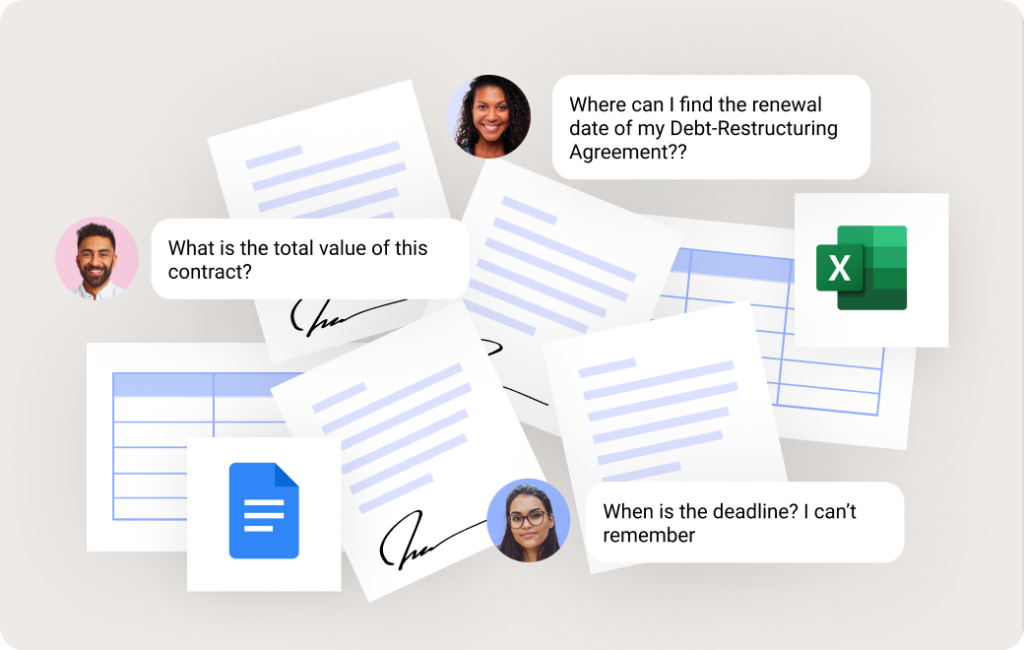
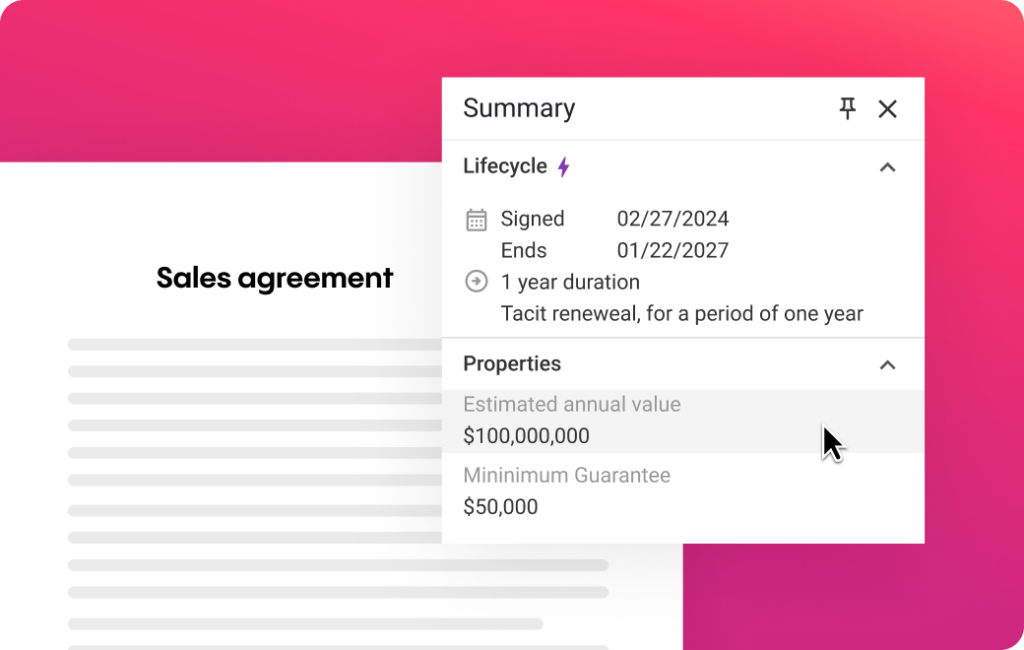
One Place for all your Contracts
Unlimited storage
Store every contract, securely, without worrying about limits
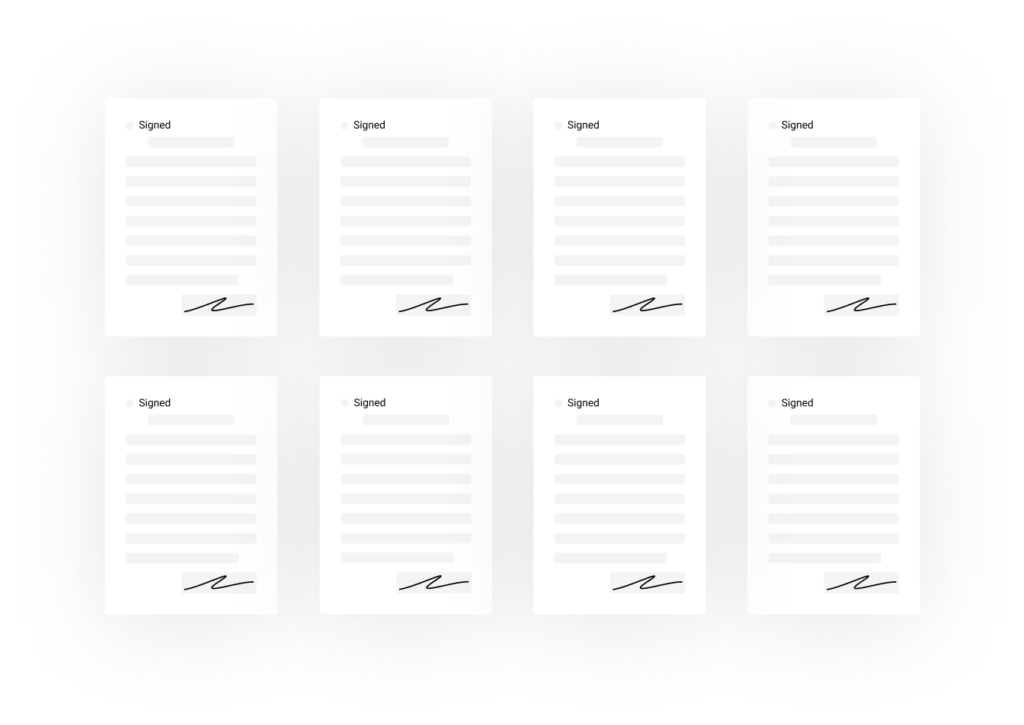
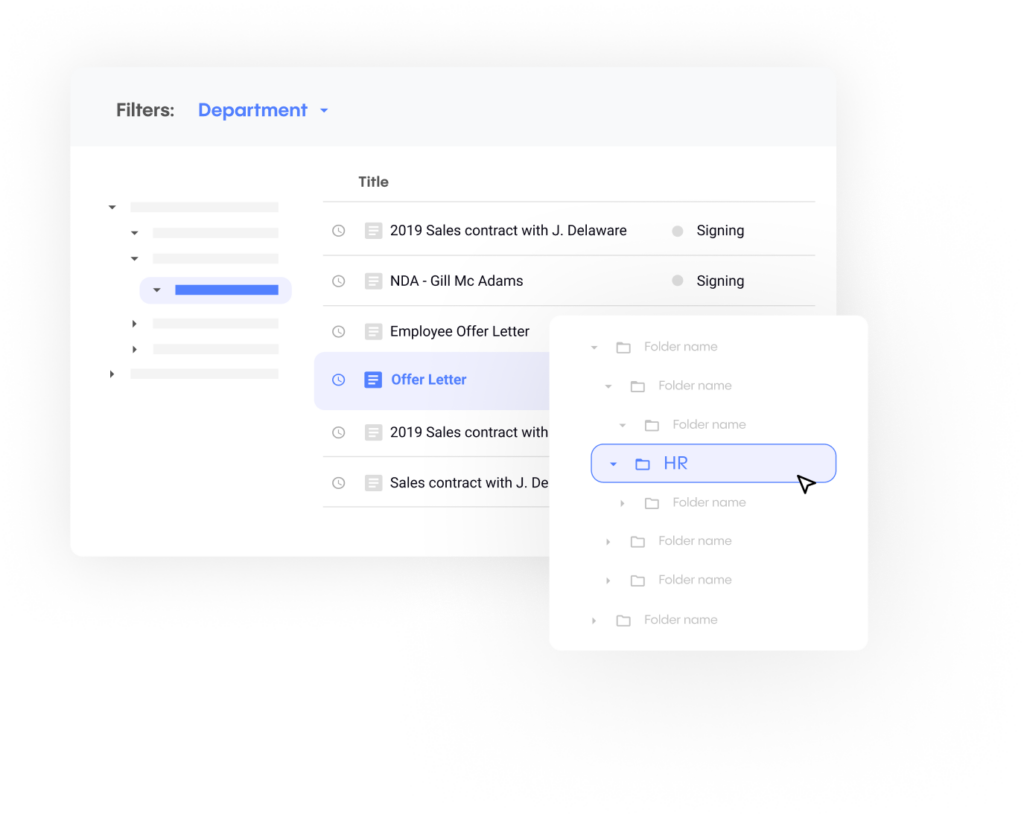
Custom permissions
Control who accesses each document with custom permission settings
Smart search
Find any contract instantly with powerful search and filtering tools
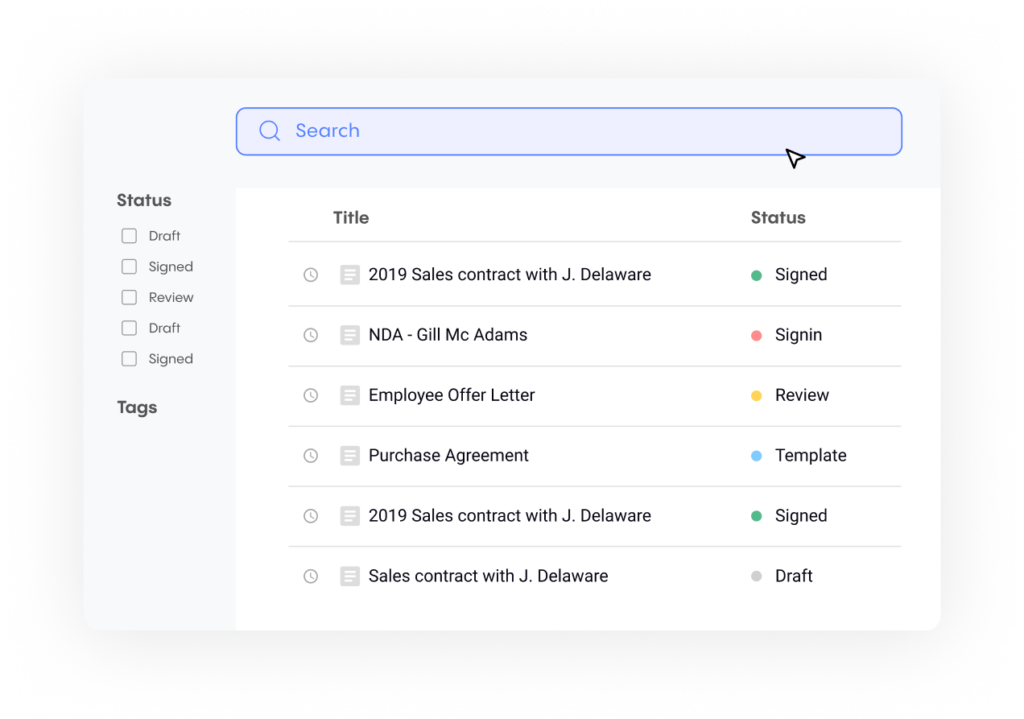

Real-time collaboration
Work together seamlessly with team members, regardless of location or department
Automate contracts from end to end with contract lifecycle management software
Custom workflows
Set up unlimited approval workflows for every type of contract
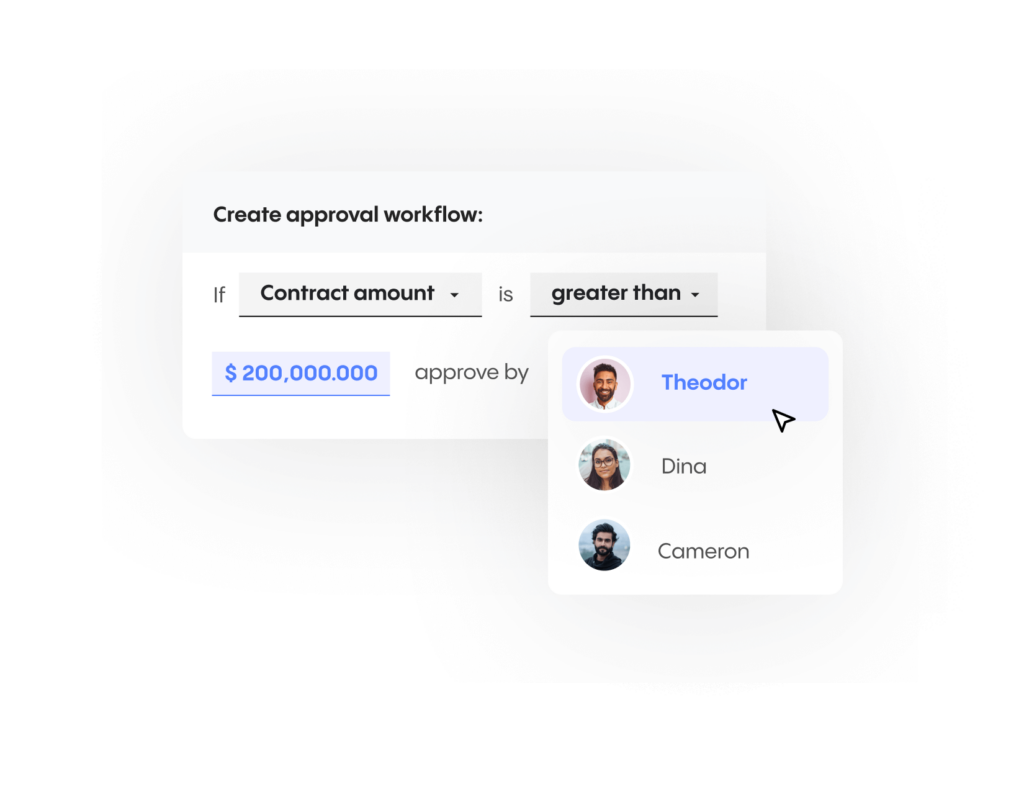
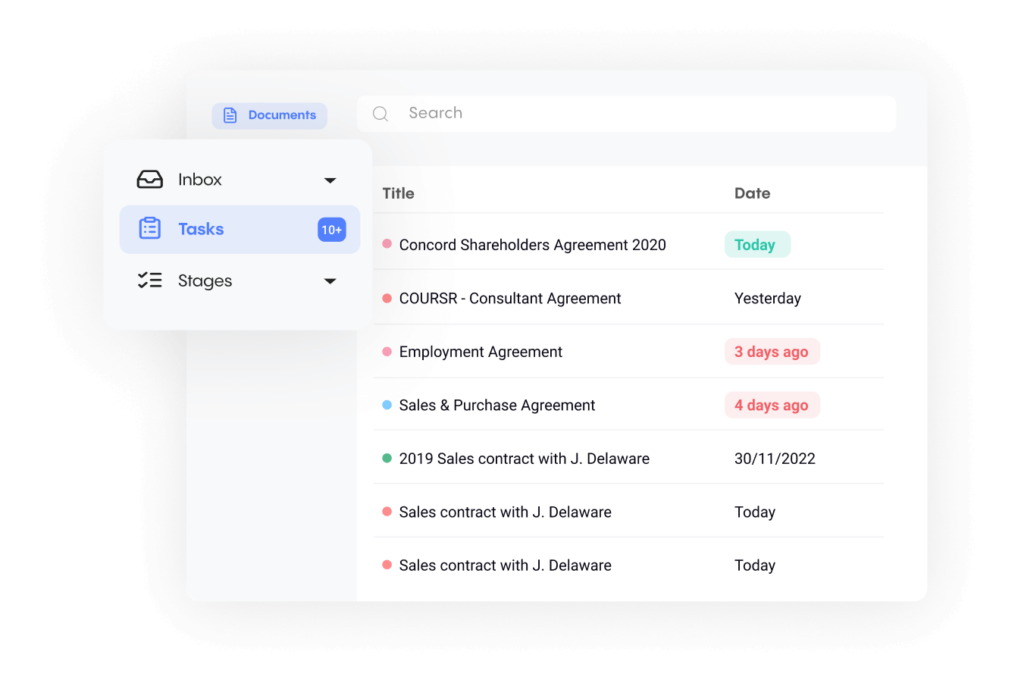
Notifications and reminders
Never miss another renewal date or approval with smart alerts
CASE STUDY
Concord saves Sevita $5,000+ per month on auto-renewals
“Many hours saved, many dollars saved in contracts that we meant to terminate and forgot.”
Read the case study
Jennifer Neville
Associate Corporate General Counsel at Sevita
The Highest Level of Security for your Contracts
Enterprise-grade Security
Concord implements enterprise-grade measures, including SOC 2 Type II certification, GDPR compliance, and a Star Level One rating from the Cloud Security Alliance.
Audit Trails
Track every interaction with contracts for complete transparency and accountability
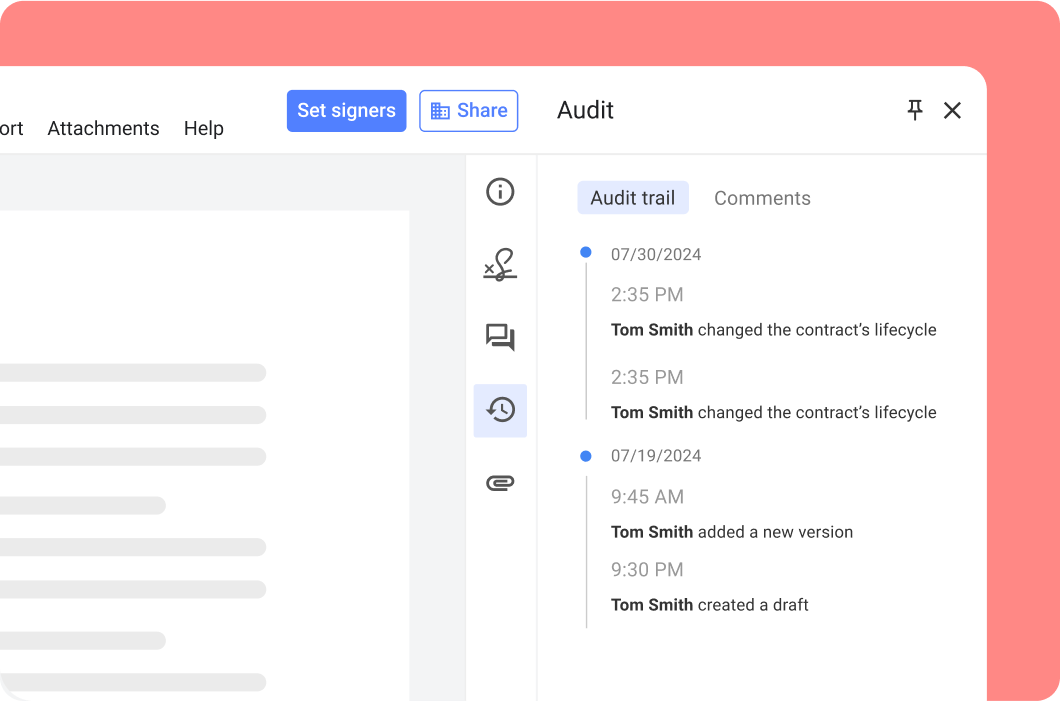
Easily Connect to your Existing Stack
CRM Integration
Create contracts that auto-fill with data from your CRM deals – then share, negotiate, and sign them in Concord
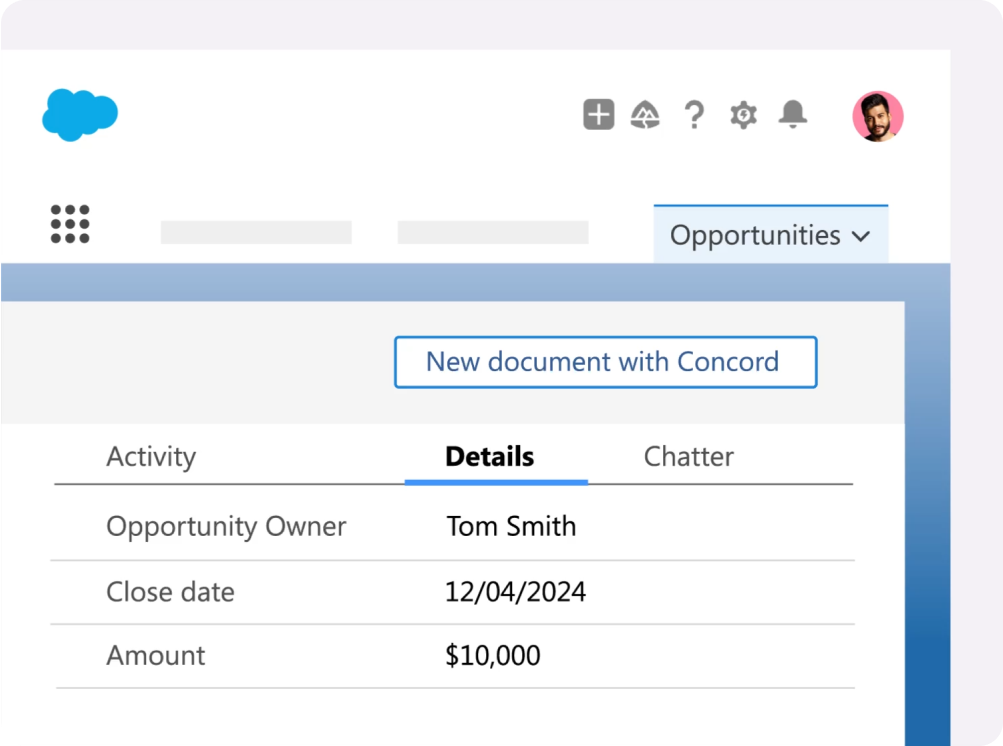
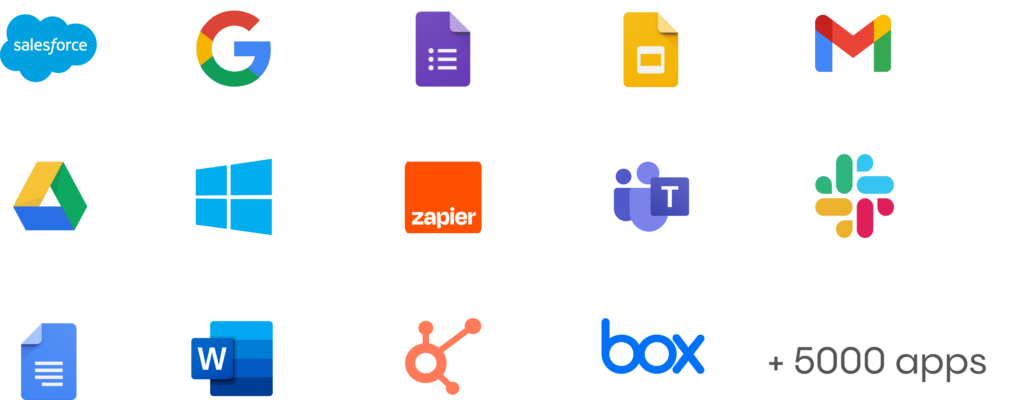
Zapier
Connect with over 5,000 apps to automate workflows across platforms
Unlock the data in all your agreements.
Close deals faster. Surface financial insights. Accelerate revenue growth.
Finalize faster with a familiar UI
Sign, store, and track your agreements, all in one platform.
Boost financials with AI-powered search
Instantly surface the files you need. Get to value faster.
Start and scale with effortless adoption
Your whole team can start sending and signing in minutes.

